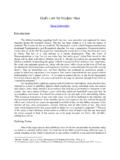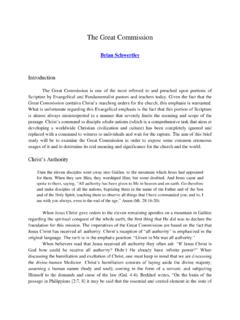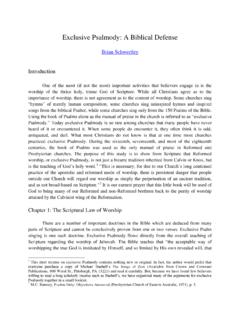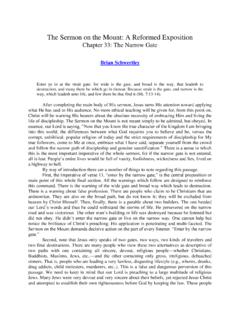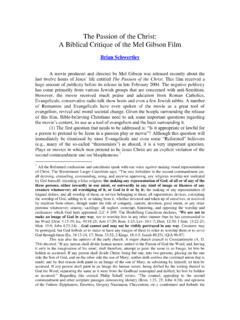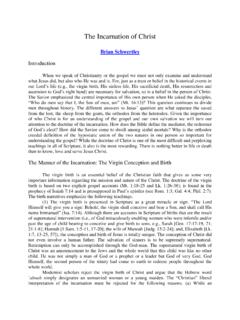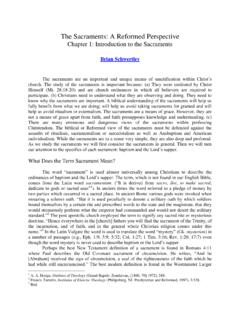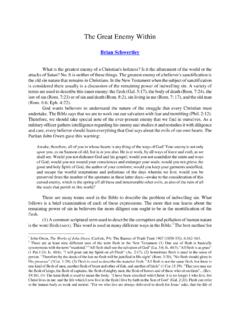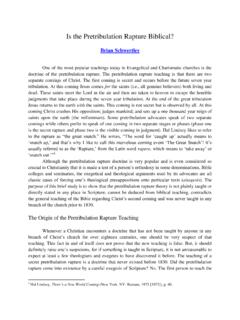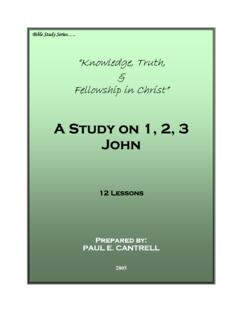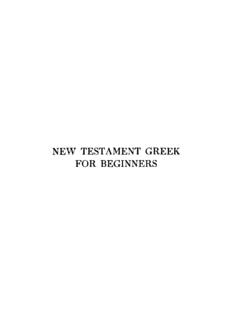Transcription of The Charismatic Movement: A Biblical Critique
1 The Charismatic Movement: A Biblical Critique By: Brian Schwertley Introduction The Charismatic movement is one of the most popular and growing forces within Christendom today. The major doctrinal distinctives of the Charismatic movement the baptism in the Holy Spirit, tongues-speaking, prophecy, the gift of healing and the emphasis on having a personal experience are primary reasons for the movement s growth and popularity. While growth and popularity are certainly desirable, they cannot be used as a test for truth-claims, because various cults ( , Jehovah s Witnesses, Mormons) and false religions ( , Islam, Eastern mysticism) have also witnessed great popularity and growth. The Charismatic movement is a twentieth-century phenomenon.
2 Since the teachings and practices of the Charismatic movement are different than what orthodox Christians have taught for 19 centuries, we believe it is wise to examine these teachings under the light of Scripture. We are not saying that Charismatics are not Christians. And we are not examining their distinctives because we dislike Charismatics personally (the author was a Charismatic for over three years, and many of his friends are still Charismatic ). God commands us to Test all things; hold fast what is good (1 Th. 5:211). We are commanded to hold fast the faithful word and refute those who contradict (Tit. 1:9 NASB). Thus, we offer this booklet in the spirit of Christian love love for our brethren, and above all, love for God s truth.
3 In examining any issue, the most important question is, What saith the scripture? (Gal. 4:30 KJV). Baptism in the Holy Spirit One of the hallmarks of the Charismatic movement is what is called Spirit-baptism or the baptism in the Holy Spirit. The baptism in the Holy Spirit is regarded as an experience that usually happens after conversion. Most Charismatics would say that at conversion a Christian receives the Holy Spirit. But only at the subsequent baptism in the Holy Spirit does the Christian receive the fullness of the Spirit, the full empowerment for Christian service. Many but not all Charismatics believe that Spirit-baptism is always accompanied with the gift of speaking in tongues as evidence for the baptism.
4 Spirit-baptism is considered a second work of grace; that is, one can be a genuine Christian yet not be baptized in the Holy Spirit. The baptism of the Holy Spirit as a second work of grace after conversion is the cornerstone of Pentecostal theology. If this doctrine is unbiblical, we should regard the Charismatic movement as unbiblical. The Bible is the only infallible rule for faith and practice. Thus, our experiences, impressions and feelings must be subordinated to what the Bible teaches. Does the Bible teach that every Christian should seek the baptism in the Spirit? Or does the Bible teach that the 1 Scripture references are from the New King James Version, unless otherwise noted.
5 Outpouring of the Spirit was a unique historical event related to Christ s enthronement at the right hand of God the Father? If the outpouring was a crucial aspect of salvation history (like the resurrection and ascension), then we must regard it as a non-repeatable, once-for-all event. Pentecost marked the final transition from the old era of shadows and types to the new era of fulfillment. Pentecost was the birthday of the Christian church, the beginning of the age of the Spirit. In this sense, therefore, Pentecost can never be repeated, and does not need to be repeated. 2 The first reason that Pentecost should be regarded as a unique historical event in salvation history is the fact that the outpouring of the Spirit was a prophesied event.
6 Peter specifically says that Pentecost is the direct fulfillment of Joel 2:28-32: This is what was spoken by the prophet Joel. John the Baptist said of Christ, This is He who baptizes with the Holy Spirit (Jn. 1:33; cf. Mk. 1:7-8, Lk. 3:16). Jesus Himself said that the Spirit would be poured out after His ascension: It is to your advantage that I go away; for if I do not go away, the Helper will not come to you; but if I depart, I will send Him to you (Jn. 16:7; cf. Ac. 1:5). The second reason Pentecost should be regarded as a unique historical event is the way Scripture connects Pentecost with Christ s glorification or enthronement at the right hand of God. Jesus Christ, as the divine-human mediator, humbled Himself, obeyed the law in exhaustive detail, and suffered and died as a vicarious atonement for the sins of His people.
7 After His resurrection, God exalted Christ and glorified Him as the divine-human mediator (in His divine nature, Christ could not receive any more glory or exaltation, because He was God). An aspect of Christ s glorification is His baptizing His church with the Holy Spirit. But this He spoke of the Spirit, whom those who believed in Him were to receive; for the Spirit was not yet given, because Jesus was not yet glorified (Jn. 7:39). In his sermon on the day of Pentecost, Peter explains what occurred: Therefore being exalted to the right hand of God, and having received from the Father the promise of the Holy Spirit, He [Christ] poured out this which you now see and hear (Ac. 2:33). The participles being exalted and having received are both aorist3; the verb poured out is also aorist.
8 Thus it is evident that Peter was talking about a historical fact not an ongoing process. Christ s death, resurrection, ascension and pouring out of the Holy Spirit on the church are all treated in Scripture as historical events in salvation-history, never to be repeated. The third reason Pentecost must be regarded as a unique historical event is the fact that after Pentecost (with the exception of Ac. 8:14-17, which will be discussed later) believing in Christ and receiving the Holy Spirit are simultaneous. The account of Peter s preaching the gospel to the Gentiles in Acts 10:34-48 reveals that the Gentiles received the Holy Spirit the moment they believed. At the climax of Peter s sermon, the Gentiles received the Holy Spirit.
9 That Peter equated their baptism in the Spirit with their salvation is clear from the fact that Peter immediately commanded them to be baptized in the name of the Lord (Ac. 10:48). The norm is salvation and the Spirit at the same time. The Apostle Peter was present and therefore he could report to the church council (made up of Jews) that the Gentiles were true believers. At the same time, the Gentiles would recognize apostolic authority because Peter had been with them and 2 Anthony A. Hoekema, Tongues and Spirit Baptism: A Biblical and Theological Evaluation (Grand Rapids: Baker, 1981), p. 19. 3 The fundamental significance of the aorist is to denote action simply as occurring, without reference to its It presents the action or event as a point, and hence is called punctilliar (H.)
10 E. Dana and Julius R. Mantey, A Manual Grammar of the Greek New Testament (Macmillan, 1969 [1927]), p. 193. indeed [was] the one who led them to Christ. And both groups knew they had the same Holy Spirit. 4 Note that the focus of Acts 10 and 11 is not how to receive the Holy Spirit or how to receive a second blessing, for the Gentiles did not ask for or seek Spirit-baptism. The point of both chapters is to show that God has also granted to the Gentiles repentance to life (Ac. 11:18). A passage which has been often used as a proof text for receiving Spirit-baptism subsequent to believing is Acts 19:1-7. The use of this passage by Pentecostals is based on a faulty translation in the King James Version: Have ye received the Holy Ghost since ye believed?
